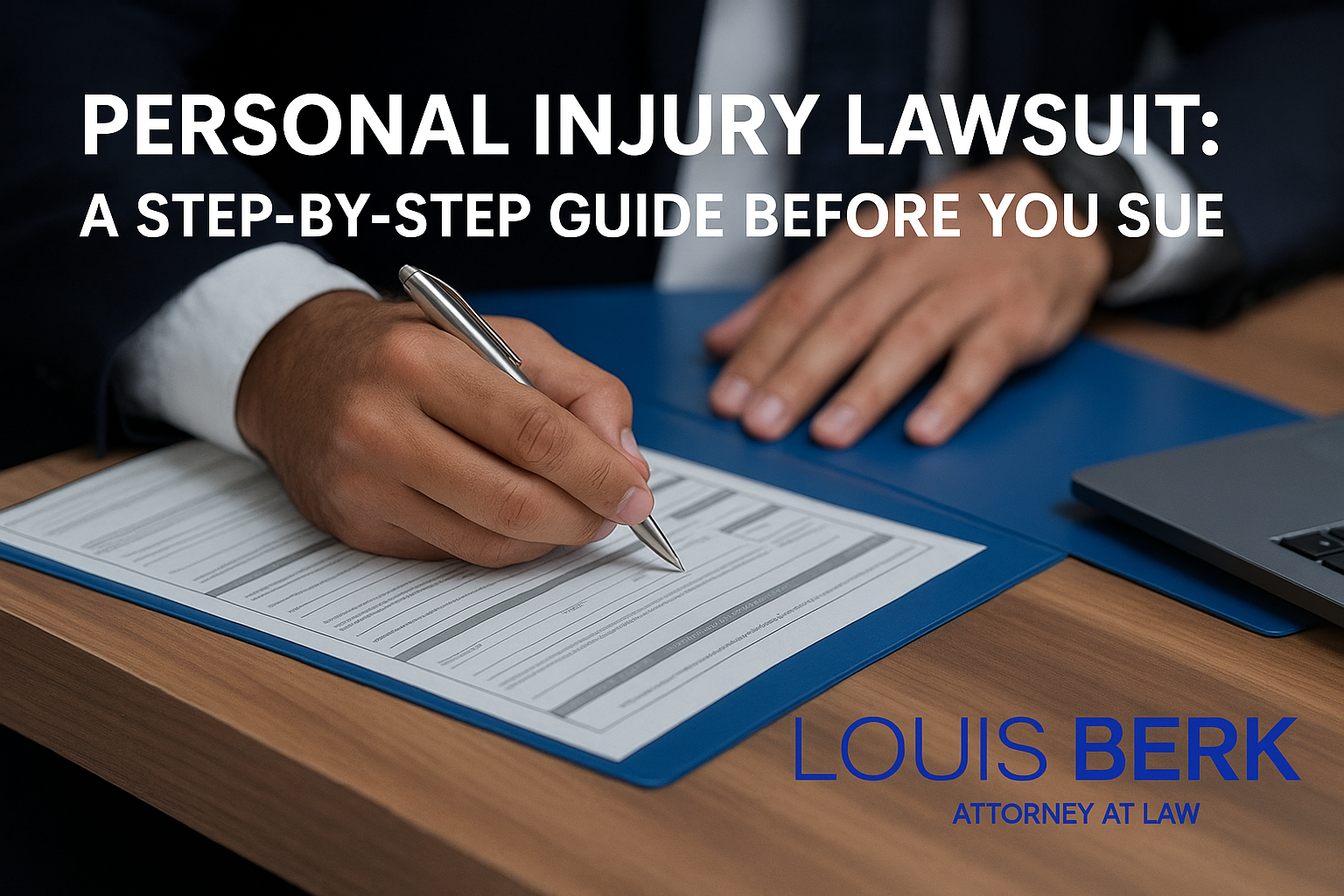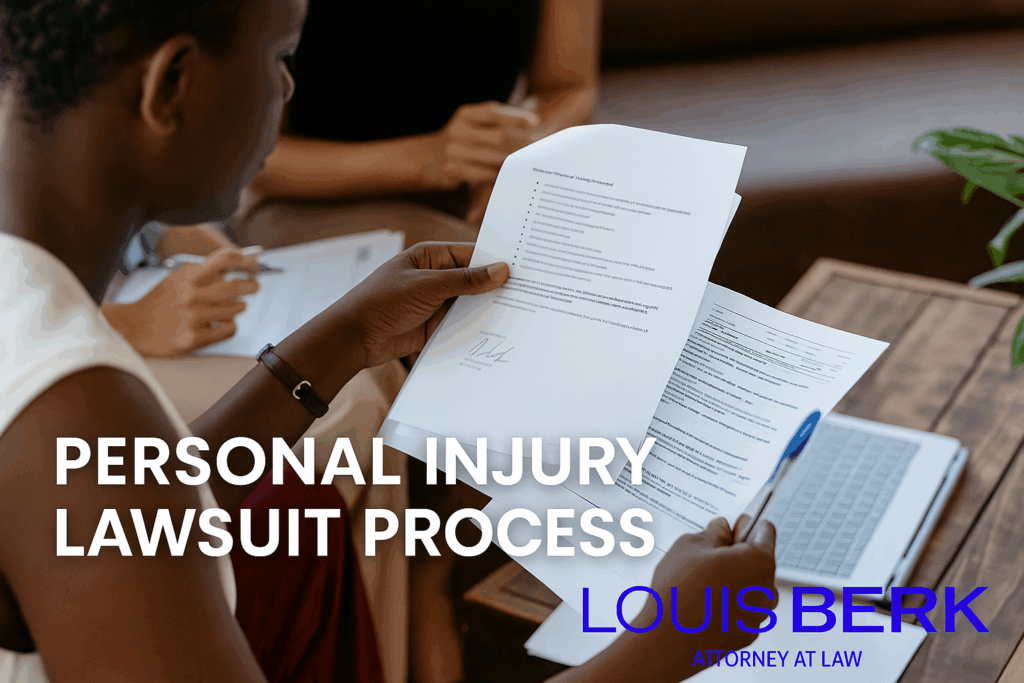
Puntos clave: ¿
a su demanda por lesiones personales?
Índice
Más de 50 millones de dólares

¿Ha sufrido una lesión y está pensando en presentar una demanda?

Nadie planea un accidente. Pero cuando de repente tienes que hacer frente a facturas médicas, faltas al trabajo y dolor, todo por la negligencia de otra persona, no deberías quedarte con las manos vacías. No se trata sólo de una lesión. Se trata de justicia. Y eso es exactamente lo que una demanda por lesiones personales es para: para ayudar a mantener la parte responsable responsable y obtener la compensación que necesita para seguir adelante. Ahora, lo entendemos - demandar a alguien puede sonar como un laberinto legal estresante y costoso. Es posible que se pregunte: "¿Qué es una demanda por lesiones personales?" o "¿Cómo se presenta una demanda de este tipo?". Esta guía lo explica todo, sin jerga jurídica ni palabrería. Sólo respuestas claras sobre:
- ¿Qué es una demanda por lesiones personales ?
- Cómo funciona el proceso de demanda por lesiones personales
- ¿Qué tipo de indemnización puede esperar?
- Y por qué contar con el abogado adecuado puede ser decisivo.
¿Qué es una demanda por lesiones personales?
Simplifiquemos: una demanda por lesiones personales es una reclamación legal presentada por alguien que ha resultado lesionado (es decir, usted, el demandante) contra la persona, empresa o entidad que causó la lesión (el demandado). Ese daño puede deberse a un descuido, imprudencia o incluso a acciones intencionadas. El objetivo de la demanda por lesiones no es la venganza, sino la recuperación. Y eso significa indemnización por cosas como:
- Gastos médicos (pasados y futuros)
- Pérdida de salario o ingresos
- Dolor y sufrimiento
- Angustia emocional
- Daños materiales, si procede
En resumen, se trata de volver a estar como antes de la lesión, o lo más cerca posible.
Cómo presentar una demanda por lesiones personales: Lo que debe saber antes de presentar una demanda
Antes de presentar un solo documento legal, hay cosas fundamentales que debe saber -y hacer- para asegurarse de que su demanda por lesiones personales despega adecuadamente. No se trata de ir a juicio todavía. Se trata de construir los cimientos de un caso fuerte y ganable.
1. Saber si tiene un caso
No todos los accidentes dan lugar a una demanda. Pero si su lesión fue causada por la negligencia de otra persona, hay una buena probabilidad de que usted tiene derecho a una indemnización. Una consulta rápida con un abogado de lesiones personales puede darte claridad en cuestión de minutos.👉 Para profundizar en el proceso, esta guía sobre cómo presentar una demanda por lesiones personales desglosa todos los pasos que debes conocer antes de emprender acciones legales.
2. Entender en qué consiste un pleito
Seamos sinceros: demandar a alguien es un compromiso. Habrá papeleo, negociación y puede que incluso un tribunal. Saber qué esperar por adelantado le ayuda a prepararse emocional y financieramente. Si tiene curiosidad sobre el proceso legal en Florida, el Centro de Autoayuda de los Tribunales de Florida ofrece recursos y orientación oficial para ayudarle a entender cómo funciona el sistema.
3. Reúna los documentos adecuados
Antes de archivar, recopile:
- Historial médico
- Fotos o vídeos del lugar del accidente
- Informes policiales o de incidentes
- Información de contacto del testigo
- Recibos de los gastos relacionados con la lesión
Estos son los componentes básicos de cualquier demanda sólida por lesiones.
4. Evite hablar con la compañía de seguros de la otra parte
Aquí es donde mucha gente comete errores. Decir algo equivocado puede perjudicar su caso. Deje que sea su abogado quien hable: está formado para ello.
5. Contratar al abogado adecuado
Este es el paso más importante para presentar correctamente una demanda por lesiones personales. Tu abogado se encargará de todos los trámites legales y protegerá tus intereses en todo momento.
El proceso de demanda por lesiones personales: qué ocurre después de presentar la demanda

El proceso legal se pone en marcha una vez que su abogado de lesiones personales presenta oficialmente su demanda. Y aunque los dramas judiciales de la televisión lo hacen parecer caótico, el proceso real sigue una estructura clara, si cuenta con el equipo adecuado para guiarle. Esto es lo que puede esperar una vez presentada la demanda por lesiones personales: PasoQué ocurre1. Ambaspartes intercambian pruebas: historiales médicos, informes de accidentes, declaraciones y mucho más. Se trata de la transparencia y la construcción de su caso más fuerte.2. NegociaciónLa mayoría de los casos de demanda por lesiones personales se asientan antes de llegar a una sala de audiencias. Su abogado negociará duro para asegurar una oferta justa que refleje sus daños.3. Mediación (A veces)En algunos casos, un tercero neutral ayuda a ambas partes a encontrar un terreno común. Es una oportunidad para resolver el caso sin ir a juicio.4. Juicio (si es necesario)Si no se llega a un acuerdo, su caso irá ante un juez o un jurado. Aquí es donde su abogado presenta su caso y lucha por la compensación que se merece.5. Veredicto y pago de liquidaciónSiusted gana, usted recibirá un premio ordenado por la corte o finalizar un acuerdo. Su abogado le ayudará a gestionar los embargos, los honorarios legales y el reparto.
Un factor importante que puede influir en el resultado de su caso es la culpa comparativa. En Florida, si se determina que eres parcialmente responsable del incidente que causó tu lesión, tu indemnización puede reducirse en consecuencia.
En Ley de Florida §768.81si se determina que usted tiene más del 50% de la culpa, es posible que no reciba ningún tipo de indemnización por daños y perjuicios. Esta es la razón por pruebas claras, orientación jurídica, y la preparación estratégica son esenciales en todas las etapas del proceso de demanda por lesiones personales.
¿Qué facilita el proceso?
- La preparación previa a la presentación marca la pauta del éxito.
- Una demanda por lesiones bien documentada y con pruebas sólidas proporciona a su abogado una ventaja en cada etapa.
- Trabajar con un abogado que entiende el proceso de demanda por lesiones personales por dentro y por fuera - no uno que sólo espera llegar a un acuerdo rápido.
Una vez que su caso está en movimiento, usted necesita un equipo legal que sabe cómo navegar por cada giro, plazo, y la táctica de negociación de la defensa lanza a su manera. Porque conseguir justicia no es solo presentar una demanda, es terminar con fuerza.
¿Cuánto tarda en resolverse una demanda por lesiones personales?
La respuesta breve es: depende. Algunos casos de demandas por lesiones personales se resuelven en pocos meses. Otros tardan un año o más. He aquí algunos factores clave que influyen en los plazos:
- ¿Cuál es la complejidad del caso? Los casos con varias partes o de responsabilidad controvertida llevan más tiempo.
- ¿Cuál es la gravedad de las lesiones? El alcance total de la recuperación médica puede necesitar tiempo para aclararse.
- ¿Son duras las negociaciones? Algunas compañías de seguros alargan las cosas, esperando que usted se conforme con menos.
👉 Una vez que se llega a un acuerdo, por lo general recibe su cheque dentro de 2 a 6 semanas, dependiendo del papeleo, las resoluciones de embargo preventivo, y otras formalidades.Curioso acerca de cómo funcionan los asentamientos de lesiones personales o lo que su caso podría valer? Explore nuestra completa Guía de acuerdos por lesiones personales con ejemplos reales, rangos de pago y consejos de negociación probados.
Demandas por lesiones personales: ¿Qué tipo de lesiones dan lugar a acciones legales?

No todos los accidentes desembocan en una demanda, pero muchos más de los que la gente cree cumplen los requisitos. Si te has lesionado y te preguntas si tu situación cuenta, aquí tienes la verdad: si la negligencia de alguien causó tu lesión, puedes tener un caso - incluso si la parte culpable es una agencia gubernamental.
De hecho, Florida permite demandas contra ciertas entidades públicas bajo condiciones específicas, esbozadas en Estatuto de Florida §768.28que renuncia a la inmunidad soberana en casos de negligencia. Si sufrió lesiones en una propiedad pública o a manos de un empleado municipal, aún puede tener derecho a una indemnización, pero se aplican plazos estrictos de notificación y presentación.
Ejemplos reales de casos de demandas por lesiones personales:
Tipo de casoA qué se pareceAccidentes detráficoUn conductor distraído le embiste por detrás en un semáforo en rojo, causándole latigazo cervical y dolor de espalda.Lesiones por resbalón ycaídaSe cae en una tienda de comestibles donde el suelo estaba mojado y no había ninguna señal de advertencia.Mordeduras de perroElperro suelto de un vecino le muerde mientras pasea por su barrio.Negligencia médicaUnmédico interpreta erróneamente los resultados de unas pruebas, lo que retrasa el diagnóstico y provoca más daños.Accidentes laboralesUnequipodefectuosoen el lugar de trabajo provoca lesiones graves en las manos o la espalda.Productos defectuososUnelectrodoméstico de cocina se incendia debido a un fallo de diseño, lo que provoca quemaduras. No son casos raros. No son casos "posibles". Son situaciones cotidianas en las que la gente ha presentado -y ganado- demandas por lesiones personales.
¿Qué tienen en común estos casos?
Todos se reducen a negligencia: alguien no actuó con responsabilidad y otro pagó el precio. Tanto si se trata de un conductor descuidado, como de un propietario que ha tomado atajos o de un fabricante que ha ignorado las normas de seguridad, el resultado es el mismo: usted se queda con los daños. Según la legislación de Florida, tiene derecho a solicitar una indemnización. Pero sólo si actúa.
Conclusión: No suponga. Pregunte.
Demasiada gente descarta sus lesiones por "no ser lo bastante graves" o "no merecer la pena". Así es exactamente como las reclamaciones válidas se escapan por las grietas. Si usted piensa que podría tener un caso, no adivine - obtener respuestas. Un abogado de lesiones personales puede revisar los hechos, explicar sus opciones, y ayudarle a seguir adelante con confianza.
3 peligrosos mitos sobre las demandas por lesiones personales (que podrían costarle caro)
Internet está lleno de malos consejos. Antes de que te decidas, vamos a aclarar algunos de los principales conceptos erróneos que impiden a la gente demandar, incluso cuando tienen un caso sólido.
Mito nº 1: "Puedo encargarme yo mismo de la demanda".
Sí, puedes intentar tratar con la compañía de seguros por tu cuenta. Pero la verdad es que los peritos de seguros no son tus amigos: están entrenados para minimizar los pagos. Una palabra equivocada, un detalle omitido, y usted podría perder miles. Un abogado de lesiones personales conoce las trampas y sabe cómo evitarlas. No corra ese riesgo.
Mito nº 2: "Los abogados son demasiado caros".
Falso. La mayoría de los abogados de lesiones personales trabajan con honorarios condicionales, lo que significa que usted no paga nada por adelantado y sólo paga si ganan su caso. Si usted no es indemnizado, ellos tampoco. Esto hace que la ayuda legal de calidad sea accesible para todos.
Mito nº 3: "Mis lesiones no son lo bastante graves como para demandar".
Las lesiones que parecen "leves" pueden provocar dolor a largo plazo, bajas laborales o una costosa rehabilitación. Algunas afecciones (como los daños en los tejidos blandos o las lesiones internas) no se manifiestan de inmediato. Incluso si no estás seguro, es inteligente hablar con un abogado y proteger tus derechos desde el principio.
Demandas por mordeduras de perro en Florida: Lo que necesita saber
Veamos un escenario común pero doloroso: los casos de mordeduras de perro. Bajo la ley de Florida, los dueños de perros tienen responsabilidad estricta. Eso significa que usted no tiene que probar que el perro tenía un historial de agresión. Si la mordedura se produjo en una propiedad pública (o si usted se encontraba legalmente en una propiedad privada), el propietario suele ser responsable, simple y llanamente. Usted puede tener una demanda válida por lesiones personales si:
- La mordedura requirió atención médica
- Ha sufrido secuelas físicas o emocionales duraderas
- Hay pruebas de negligencia o falta de control por parte del propietario
¿Qué afecta a la indemnización por mordedura de perro?
- Gravedad de las lesiones: Heridas graves = mayor indemnización
- Pruebas: Las fotos, las declaraciones de testigos y los historiales médicos refuerzan tu caso
- Seguros: Muchas reclamaciones por mordeduras de perro se pagan a través de las pólizas de los propietarios de viviendas
Por qué nunca debe enfrentarse solo a una demanda por lesiones personales
No estamos aquí para asustarle, pero sí para ser sinceros. Tratar de manejar una demanda por lesiones personales solo es como ir a un combate de boxeo con los ojos vendados. Esto es lo que un gran abogado de lesiones personales hace por usted:
- Evalúa tu caso: ¿Merece la pena seguir adelante? ¿Cuánto vale? Lo sabrás desde el primer día.
- Gestiona las negociaciones: Se acabó batallar solo con los peritos de seguros.
- Se encarga del papeleo: ¿Plazos de presentación? ¿Documentos judiciales? ¿Procedimientos legales? Cubierto.
- Vamos a juicio si es necesario: Si la otra parte no cede, luchamos en los tribunales, por usted.
Cuando más importa, Louis Berk Law está a su lado

Conocer sus derechos es poderoso, pero actuar sobre ellos es lo que trae la justicia. Si usted ha sido herido en un accidente de coche, mordido por un perro, o sufrido cualquier lesión grave debido a la negligencia de otra persona, usted merece más que simpatía. Usted merece acción. En Louis Berk Law, no sólo presentamos demandas por lesiones personales, luchamos para ganarlas. Tanto si todavía se está preguntando si debería presentar una demanda por lesiones personales como si está listo para emprender acciones legales hoy mismo, lo peor que puede hacer es esperar. Cuanto más se demore, más complejo puede llegar a ser su caso - y más poder le da a la otra parte.
¿Listo para hablar de su caso?
En Louis Berk Law, luchamos duro - y luchamos inteligentemente. Si usted ha sido herido y está considerando una demanda por lesiones personales, no espere. Vamos a revisar su caso, responder a sus preguntas, y le guiará a través de los próximos pasos - con claridad, confianza y compasión. 📞 Reserve su consulta gratuita hoy. Permítanos ayudarle a dar ese primer paso hacia la justicia.
Preguntas frecuentes sobre demandas por lesiones personales
¿Qué es una demanda por lesiones personales?
Una demanda por lesiones personales es una reclamación legal presentada por una persona lesionada (demandante) contra la parte responsable de causar el daño. En ella se pide una indemnización por las facturas médicas, los salarios perdidos y otros daños relacionados con la lesión.
¿Cómo se presenta una demanda por lesiones personales?
Para presentar una demanda por lesiones personales, debe reunir pruebas de la negligencia, buscar tratamiento médico y consultar a un abogado especializado en lesiones personales. Tu abogado se encargará del papeleo legal y presentará la demanda ante el tribunal.
¿Cuánto dura una demanda por lesiones personales?
El plazo de una demanda por lesiones personales depende de factores como la complejidad del caso, la gravedad de las lesiones y el proceso de negociación. Su resolución puede tardar desde unos meses hasta más de un año.
¿Necesito un abogado para presentar una demanda por lesiones personales?
Aunque técnicamente es posible presentar una demanda por su cuenta, trabajar con un abogado experimentado en lesiones personales mejora significativamente sus posibilidades de construir un caso sólido y negociar una indemnización justa.
¿Qué tipos de casos pueden considerarse demandas por lesiones personales?
Los casos más comunes de demandas por lesiones personales incluyen accidentes de coche, resbalones y caídas, mordeduras de perro, lesiones en el lugar de trabajo y negligencias médicas. Cualquier lesión causada por la negligencia de otra persona puede calificar.
Lo sentimos. No se han encontrado artículos.
*** Al proporcionar un número de teléfono, consiente que nos pongamos en contacto con usted mediante mensajes de texto SMS. Pueden aplicarse tarifas de mensajes y datos. Puede responder STOP para no recibir más mensajes y obtener más ayuda enviando AYUDA.



